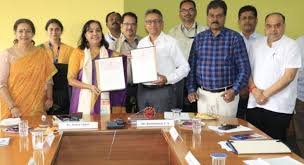ICAR-CIFE and VAMNICOM Sign MoU to Enhance Cooperative Management in Fisheries
Introduction to the MoU
The Indian Council of Agricultural Research-Central Institute of Fisheries Education (ICAR-CIFE) and Vaikunth Mehta National Institute of Cooperative Management (VAMNICOM) have recently signed a Memorandum of Understanding (MoU). This MoU aims to enhance cooperative management within the fisheries sector in India, focusing on education, research, and the practical implementation of cooperative management strategies. This partnership is expected to bring significant improvements in the way fisheries cooperatives are managed, ensuring better livelihoods for those involved in this industry.
Objective of the MoU
The primary objective of this MoU is to promote sustainable practices in the fisheries sector through the cooperative model. Both ICAR-CIFE and VAMNICOM will work collaboratively to develop training programs, workshops, and seminars that will educate stakeholders about the importance of cooperative management. These initiatives are designed to empower the fishermen and cooperative societies by providing them with the necessary tools and knowledge to manage their resources more effectively.
Impact on Fisheries Sector
The signing of this MoU is expected to have a profound impact on the fisheries sector in India. By enhancing cooperative management, the MoU will lead to improved productivity and sustainability in fisheries. This initiative aligns with the government’s vision of promoting sustainable development in the fisheries sector, which is crucial for the economy and food security. The collaboration will also pave the way for new research and innovations that will benefit the fisheries industry in the long term.
Training and Capacity Building
One of the key aspects of this MoU is the focus on training and capacity building. ICAR-CIFE and VAMNICOM will jointly develop specialized courses and training modules that will be made available to fishermen, cooperative managers, and other stakeholders in the fisheries sector. These programs will cover various aspects of cooperative management, including financial management, resource allocation, and sustainable practices. The goal is to build a more informed and capable workforce that can drive the growth of the fisheries sector in India.
Future Prospects of the Collaboration
Looking forward, this collaboration between ICAR-CIFE and VAMNICOM holds the potential to revolutionize the fisheries sector in India. By bringing together expertise in agricultural research and cooperative management, the partnership aims to create a more resilient and sustainable fisheries industry. The MoU is just the beginning of what could be a series of initiatives aimed at strengthening the sector, ensuring its long-term viability and contribution to the Indian economy.

Why This News is Important
Enhancing Cooperative Management
The significance of this MoU lies in its potential to enhance cooperative management within the fisheries sector, which is a critical component of India’s economy. By improving how fisheries cooperatives are managed, the MoU aims to boost productivity and sustainability, thereby securing the livelihoods of millions of people who depend on this industry.
Contribution to Sustainable Development
This collaboration is also crucial in the context of sustainable development. The fisheries sector is facing numerous challenges, including overfishing, resource depletion, and environmental degradation. By promoting cooperative management, the MoU aligns with the government’s vision of sustainable development, ensuring that the fisheries industry can continue to thrive without compromising future resources.
Educational and Research Opportunities
The MoU opens up new educational and research opportunities in the field of fisheries management. By developing training programs and conducting research, ICAR-CIFE and VAMNICOM are contributing to the growth of knowledge and expertise in this sector. This is vital for addressing the complex challenges facing the fisheries industry today.
Economic Impact
The fisheries sector plays a significant role in the Indian economy, contributing to both employment and food security. By enhancing cooperative management, the MoU is expected to have a positive impact on the economy, improving the efficiency and sustainability of fisheries operations. This, in turn, will contribute to the overall economic development of the country.
Alignment with Government Policies
Finally, this MoU is important because it aligns with the government’s policies on cooperative management and sustainable development. The collaboration between ICAR-CIFE and VAMNICOM supports the government’s efforts to promote sustainable practices in the fisheries sector, which is essential for achieving long-term economic and environmental goals.
Historical Context
Background of ICAR-CIFE and VAMNICOM
ICAR-CIFE, established in 1961, has been a pioneer in fisheries education and research in India. It operates under the Indian Council of Agricultural Research and focuses on various aspects of fisheries and aquaculture. On the other hand, VAMNICOM, established in 1967, specializes in cooperative management and operates under the Ministry of Cooperation. Both institutions have a rich history of contributing to their respective fields, making this collaboration highly significant.
Evolution of Fisheries Cooperatives in India
Fisheries cooperatives in India have evolved over the years as a means to empower fishermen and improve their livelihoods. These cooperatives have played a crucial role in organizing fishermen, providing them with access to resources, and ensuring fair prices for their catch. The MoU between ICAR-CIFE and VAMNICOM builds on this legacy by introducing modern management practices and sustainable approaches to fisheries cooperatives.
Past Collaborations and Their Impact
This is not the first time that ICAR-CIFE and VAMNICOM have collaborated. In the past, both institutions have worked together on various projects aimed at improving fisheries management and cooperative practices. These collaborations have yielded positive results, such as improved fishery yields and better management of resources. The current MoU is expected to build on these successes and bring further advancements to the sector.
Key Takeaways from the MoU Between ICAR-CIFE and VAMNICOM
| S.No | Key Takeaway |
|---|---|
| 1 | The MoU focuses on enhancing cooperative management in the fisheries sector. |
| 2 | It aims to promote sustainable practices through education and research. |
| 3 | The collaboration will lead to improved productivity and sustainability in fisheries. |
| 4 | Training programs and capacity-building initiatives are key components of the MoU. |
| 5 | The partnership aligns with government policies on sustainable development and cooperative management. |
Important FAQs for Students from this News
Q1: What is the main objective of the MoU between ICAR-CIFE and VAMNICOM?
A1: The main objective of the MoU is to enhance cooperative management in the fisheries sector through education, research, and the implementation of sustainable practices.
Q2: How will the MoU impact the fisheries sector in India?
A2: The MoU is expected to improve productivity and sustainability in the fisheries sector by promoting better management practices, leading to more efficient resource utilization and stronger cooperative management.
Q3: What role will ICAR-CIFE and VAMNICOM play in the collaboration?
A3: ICAR-CIFE will bring expertise in fisheries education and research, while VAMNICOM will contribute its knowledge in cooperative management, together developing training programs and capacity-building initiatives.
Q4: Why is cooperative management important in the fisheries sector?
A4: Cooperative management helps organize fishermen, ensures fair resource distribution, and promotes sustainable practices, which are essential for the long-term viability of the fisheries sector.
Q5: How does this MoU align with government policies?
A5: The MoU aligns with government policies on sustainable development and cooperative management by promoting practices that ensure the long-term sustainability of the fisheries sector, contributing to both economic growth and food security.
Some Important Current Affairs Links

















